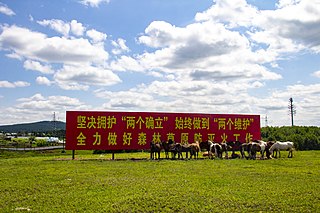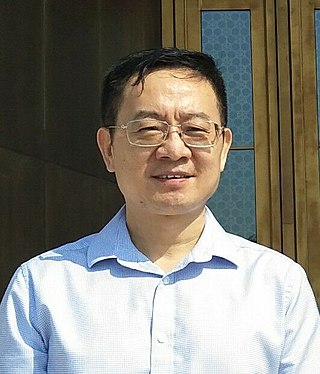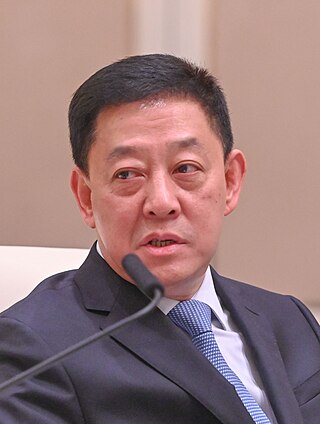
The general secretary of the Central Committee of the Chinese Communist Party is the leader of the Chinese Communist Party (CCP), the sole ruling party of the People's Republic of China (PRC). Since 1989, the CCP general secretary has been the paramount leader of the PRC.

The Secretariat, officially the Secretariat of the Central Committee of the Communist Party of China, is a body serving the Chinese Communist Party (CCP)'s Politburo and Standing Committee. The secretariat is mainly responsible for carrying out routine operations of the Politburo and coordinating organizations and stakeholders to achieve tasks set out by the Politburo. It is empowered by the Politburo to make routine day-to-day decisions on issues of concern in accordance with the decisions of the Politburo, but it must consult the Politburo on substantive matters.
The Shanghai clique, also referred to as the Shanghai gang, Jiang clique, or Jiang faction, refers to an informal group of Chinese Communist Party (CCP) officials who rose to prominence under former CCP General Secretary Jiang Zemin while he served as the party chief and mayor of Shanghai.
The Eight-point Regulation from the Central is a set of Chinese Communist Party regulations stipulated by the Politburo in 2012 aimed at instilling more discipline among party members and making the party "closer to the masses". They were first announced on 4 December 2012, after a Politburo meeting led by Xi Jinping, who then had recently became General Secretary of the CCP. Detailed implementing regulations were adopted by the Politburo in 2022.

Clear waters and green mountains, alternatively green mountains are gold mountains or two mountain theory, refers to a political slogan on environmental policy formulated by Chinese Communist Party (CCP) general secretary Xi Jinping. The full slogan is "clear waters and green mountains are as valuable as gold and silver mountains".

The 20th National Congress of the Chinese Communist Party (CCP), commonly referred to as Èrshí Dà, was held in the Great Hall of the People, Beijing from 16 to 22 October 2022. The National Congress is the highest organ of the party, and is stipulated to be held every five years. The conference had 2,296 delegates and 83 specially invited delegates.

"Two Establishes" (两个确立) and "Two Upholds" (两个维护) are two political slogans established by the Chinese Communist Party to reinforce general secretary Xi Jinping's rule.
The Presidium of the 20th National Congress of the Chinese Communist Party was elected by congress delegates in a preparatory meeting before the convening of the congress. The Presidium of the 20th National Congress leads the organisation and the agenda of the aforementioned congress.
The Qualification Review Committee of the 20th National Congress of the Chinese Communist Party was elected by congress delegates in a preparatory meeting before the convening of the congress.
The 20th Politburo of the Chinese Communist Party (CCP), formally the Political Bureau of the 20th Central Committee of the Communist Party of China, was elected at the 1st plenary session of the 20th Central Committee of the CCP on 23 October 2022 in the aftermath of the 20th National Congress. This electoral term was preceded by the 19th Politburo. Seven of the 24 members serve in the 20th Politburo Standing Committee.
Gu Shu is a Chinese banker and politician, currently serving as party secretary and chairman of the Agricultural Bank of China. Previously he served as governor of the Industrial and Commercial Bank of China from 2016 to 2020.

Gao Xiang is a Chinese historian and politician, currently serving as Chinese Communist Party Committee Secretary and president of the Chinese Academy of Social Sciences (CASS) and president of the Chinese Academy of History.
Li Xiaoxin is a Chinese politician, currently serving as deputy head of the Organization Department of the Chinese Communist Party and director of the State Commission Office for Public Sector Reform.

Hu Yuting is a Chinese executive and politician, currently serving as the governor of Jilin province. He was the former party secretary of Dalian and deputy party secretary of Liaoning from 2021 to 2023.
Zhao Gang is a Chinese executive and politician, currently serving as governor of Shaanxi.
Hou Kai is a Chinese politician, currently serving as auditor-general of the National Audit Office. He has been a member of the Standing Committee of the Central Commission for Discipline Inspection since November 2012.

Five Identifications as a term has been mentioned in many Chinese government and Chinese Communist Party (CCP) websites. It was proposed by the general secretary of the CCP, Xi Jinping. He has repeatedly emphasized its importance.

The 1st plenary session of the 20th Central Committee of the Chinese Communist Party was convened on October 23, 2022, immediately after the closing of the 20th National Congress of the Chinese Communist Party. The following were elected during the session: the General Secretary, the Politburo Standing Committee, and the Politburo. Members of the Secretariat were authorized on the basis of nominations from the Standing Committee of the Politburo, and the Central Military Commission's composition was determined. The election of the Secretary, Deputy Secretaries, and members of the Politburo Standing Committee, as selected in the first plenary session of the 20th Central Commission for Discipline Inspection, was also ratified during the session.

The 2nd plenary session of the 20th Central Committee of the Chinese Communist Party was held in Beijing from 26 to 28 February 2023.

The 3rd plenary session of the 20th Central Committee of the Chinese Communist Party was conducted in Beijing from 15 to 18 July 2024.









